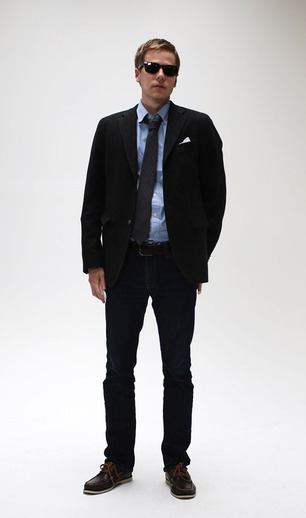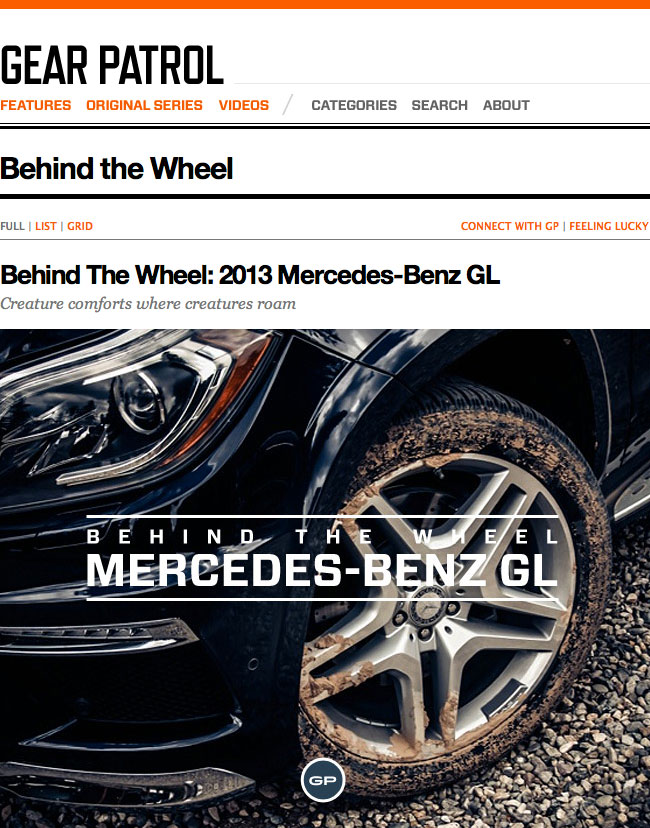Ben Bowers
A personal guide with a modern take on geek chic shopping

Sponsored content:

What began as a digital dog-ear for products of interest has quickly evolved into one of the leading lifestyle guides for men. Aptly named Gear Patrol, the online magazine is a go-to guide for gear aficionados and design-minded urban adventurers. Recalling the sleek presentation of catalogs interspersed with the conversational tone of its original series, founders Eric Yang and Ben Bowers have created a reference imbued with a personal touch of geeky chic. Honing his eye for style, Bowers got his start as a DJ, later cutting his tech trend forecasting skills as a “data nerd” for CBS. Maintaining a longstanding following since its inception in 2007, Gear Patrol appeals to an aspirational audience at the forefront of culture. Drawing from its audience, Bowers oversees a well-versed set of contributors reporting on a range of topics from tech to autos, establishing Gear Patrol as a nod to the future of shopping for the modern male.
Tell us a bit about your early career experiences and how you became the co-founder of Gear Patrol.
After college, I started working at CBS’s Digital Media Group doing web analytics and geeking out over marketing data. That’s where I first met my co-founder Eric who was working in the same division as a graphic designer. We started to connect over incredibly nerdy conversations around the water cooler where we would talk about all kinds of stuff, from home theater equipment, to skis, to cars. After a few months of back and forth debate about things, Eric showed me his personal blog which he had recently started. He was using Gear Patrol as a personal bookmark collection of sorts for products he liked, and I immediately thought the concept had enormous potential for all kinds of guys. So I told him that we should work together to mature the site into an everyday online product resource for men. Even now, five years later, I’m still not sure why he agreed to throw in with a guy like me—but it probably had something to do with recognizing a fellow southern-born NYC transplant who was equally obsessed with gear.
How has Gear Patrol evolved since its inception?
When we first started working on the site back in 2007, the internet was an excellent shopping resource if you knew exactly what you wanted to buy. But there were few outlets for guys that really captured the serendipitous sense of product discovery provided by traditional catalogs. Eric and I were both huge catalog buffs, so at the onset, we wanted to fill that void for men across a variety of different categories like tech, outdoor, fashion and automotive, leveraging the speed and ease of the web. While we’ll always continue to provide that service, our admiration for traditional print media has pushed us to expand our scope. The content of the site has always been guided by what interested us personally, and we just felt that there were so many fascinating stories that were being left out. We were also keenly aware that while products are great, and the things you choose to own are increasingly becoming a form of self-expression, “stuff” isn’t what life is all about. It’s your experiences that truly matter.
So today we’ve broadened our focus to encompass a complete view of the product world, while adding in a hefty dose of adventure—think Esquire meets Wired. Instead of just focusing on the thing on the shelf, why not interview a designer about their creative process, recap the story behind a brand’s development, or start a dialog about timeless things that have continued to influence the world long after they stopped being sold? Why not look at the conceptual and innovative ideas being kicked around today that have the potential to do the same thing in the future? Those are the kinds of stories we strive to tell now, while maintaining our distinct laser focus on visual appeal. Hopefully it’s a change our readers have appreciated. It’s certainly allowed us to do more of what we love.
Gear Patrol covers products ranging from modern gadgets to vintage cars. What underlying design elements do you look for when curating content?
Anything that’s thoughtfully designed and created with a clear purpose is something we’re interested in sharing. I think that’s the common thread that ties all of the subjects we cover together and often, it’s also what separates the average from the truly exceptional. One of the most rewarding aspects of our job is coming across something that questioned a long-standing way of approaching a task and actually improved upon it by taking another route.
We’re also suckers for beauty and excellent craftsmanship as much as the next guy, and that’s usually the difference maker when it comes to selecting things in the art or fashion realm for us.

What do you think the interplay of design and engineering is?
Roughly speaking, in my mind engineering is largely about just getting something to function and perform as advertised given certain constraints; whereas design looks at the bigger picture. To borrow from Machiavelli’s scrabble dictionary, design isn’t about ignoring the means to focus on the end goal. In the hands of great designers, all of the various means that go into a project are what make the ends so remarkable. Charles Eames said, “design is a plan for arranging elements in such a way as best to accomplish a particular purpose.” “As best to accomplish a particular purpose” is the critical point there. Truly remarkable design considers every variable, leaving the impression with those who see it that there’s just no better way go about accomplishing that particular goal.
As a diverse lifestyles magazine, who is your audience and how does Gear Patrol distinguish itself from other lifestyle sites?
We cater to aspirational guys who are constantly searching for ways to improve their lives by learning more about the things they are passionate about. Rather than simply let the world make some kind of default judgement on who they are, our readers are actively engaged in every aspect of their persona, whether it’s through the things they buy, the culture they consume, the places they go, or how they choose to spend their time.
One of our most crucial points of differentiation is the creative and artistic vision of my co-founder Eric Yang. It’s his eye for design and photography that typically makes an immediate impression on those who follow what we do. I’m incredibly lucky to have him as a partner and I have learned a tremendous amount by working with him these last five years. Combined with the passion of our entire staff, it’s a great one-two punch that we hope our readers appreciate versus other outlets out there.
Gear Patrol is passionate about travel and adventure. What are some standout products that you bring along with you when you’re on the road and what advice do you offer other travelers?
I’m never without my iPad, a snack like a Clif bar (to avoid pounding down junk food) and a great set of headphones (I rotate through a lot so it’s hard to pick out one pair). A small, but powerful camera is also key. I love my DSLR, but I often find that the added weight and hassle makes me leave it behind, resulting in missed shots. My girlfriend hates it, but I’m also an avid user of packing cubes and shirt folders. They help me stay organized before and during trips—or maybe I just like impressing the TSA during random baggage inspections.
In terms of advice, picking comfortable but presentable attire is something I’m pretty militant about. First impressions are always important, and you never know when you’ll need to sweet talk an airline staffer to get you on the last seat home. It’s hard for people to take you seriously in tearaways. Another thing I’ve learned through trial and error is to always give yourself ample time. Traveling is stressful enough. There’s no need to compound it with rushing or missing your flight because of the unexpected. Sacrifice that extra 30 minutes of sleep, get packing earlier and leave ahead of schedule.
Jeep Altitude is about edge, customization and innovation. Which of these do you identify with and why?
Customization is a real area of interest for me—especially in the age of globalization. As the internet floods us with an infinite number of things to buy, and geographic constraints disappear, the ability to tailor what you buy to meet your personal needs or tastes is a huge point of differentiation. What we choose to own defines us in some ways for better or worse, so why not own something that was actually made with at least some of your input? Economics may dictate the need for mass production, but diversity makes for a more interesting world.













